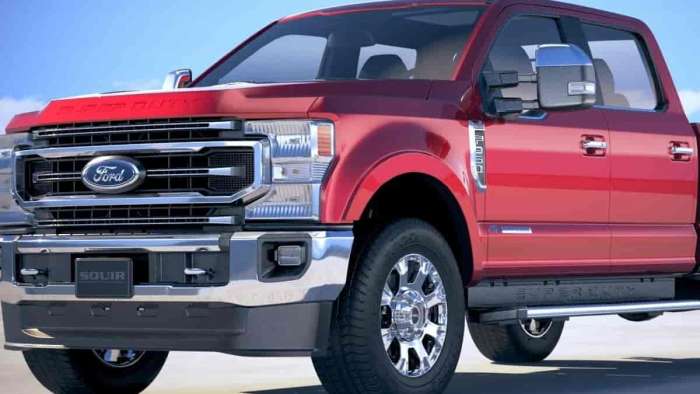The Ford Motor Company has recalled more than 850,000 SUVs and heavy-duty pickups to repair front end, rear end, and battery cable problems. In the biggest recall, the automaker has recalled more than 774,000 Explorers. The other recalls involve Ford F-350 Super Duty heavy-duty pickups and Lincoln Aviators.
In another recall, Ford has recalled some of its bread-and-butter pickups, the F-150, to fix driveshafts and steering gear as I detailed in a report.
Major Ford Explorer Recall
In the biggest recall, Ford recalled 774,696 2013 to 2017 Explorers to fix a front ball joint issue. The vehicles may experience a seized cross-axis ball joint that may, in turn, cause a fractured rear suspension toe link.
In a recent Super Duty truck recall, Ford recalled a number of Super Duty pickups to fix a front hub detachment problem. You can read about it here.
Affected vehicles may experience a clunking noise, unusual handling, or a misaligned rear wheel. The toe link fracture may significantly diminish steering control, increasing the risk of a crash.
The recall affects about 676,152 vehicles in North America, 59,935 in China, 25,257 in Ford's International Markets Group, 13,162 in Europe, and 190 in South America.
The affected vehicles are located in high-corrosion states as defined by the National Highway Traffic Safety Administration (NHTSA) or in regions with a combination of cold winter weather with relatively high humidity and substantial road salt use.
Ford assembled the vehicles at the Chicago Assembly Plant between Sept. 4, 2012, and Sept. 30, 2017, and the Elabuga Assembly Plant in Russia between Jan. 28, 2013, and July 28, 2017.
Explorer Recall May Involve Injuries
According to the automaker, there have been six allegations of injury related to this condition in North America. Owner notification will start the week of Aug. 23. Dealers will inspect the cross-axis ball joint/knuckle as necessary and replace the toe links with a revised design part. Ford has implemented a customer satisfaction program for vehicles not sold or registered in corrosion states.
The Ford reference number for this recall is 21S32.
Ford recalled 34,939 F-350 Super Duty pickups in the second safety recall, equipped with 6.7-liter engines and single rear wheels to repair an axle housing spring seat interface weld issue.

Ford F-350 Super Duty Trucks Recalled
Drivers of the affected heavy-duty pickups may experience rear driveline disconnection. In turn, this may lead to vibration and shaking while driving at highway speeds or juddering on acceleration.
In the event of a disconnected driveshaft, affected pickups may stop suddenly. Or the driver may be unable to put the pickup into Park. Until the recall is applied, drivers must use the parking brake to prevent an increased crash risk.
Ford assembled the affected vehicles at the Kentucky Truck Plant between Aug. 6, 2020, and May 15, 2021. Of the vehicles affected, 34,855 are in the U.S., with the balance in Ford's International Markets Group.
Ford is not aware of any accidents or injuries related to this condition.
F-350 Recall Involves Rear Axle Deformation
Dealers will inspect the rear axle to determine if deformation is present. If the axle is deformed, the axle housing must be replaced. If the axle isn't deformed, the dealer's technicians will perform a weld repair to the spring seats. Owner notification begins the week of Aug. 16. The Ford reference number for this recall is 21S31.

In the third recall of 2020-2021 Lincoln Aviators, equipped with 3.0-liter gas engines, Ford has issued the recall for improperly secured battery cable wire harnesses. About 40,995 Aviators are involved in this recall.
According to the automaker, because the battery cable wire harness may not be properly secured, the cables may contact the air conditioner compressor pulley. Over time, the pully may rub through the wire harness insulation and contact the unfused battery positive (B+ or red) wire circuit. This could result in a potential short circuit and fire.
The recall affects 36,258 vehicles in North America, 2,601 in the automaker's International Markets Group, and 2,136 in China. Ford is not aware of any accidents, injuries, or fires relating to this condition. Ford assembled the vehicles at the Chicago Assembly Plant between June 19, 2019, and Jan. 5, 2021.
Lincoln Aviators Recalled For Wiring Harness Problem
Owner notification begins the week of July 30. Dealers will inspect the vehicle, and:
- If there is no evidence that the battery cable has contacted the air conditioner compressor pulley, they will add a tie strap near the frame rail between the battery cable harness and the engine compartment harness.
- If any of the small gauge circuits are damaged, dealers will add a tie strap near the frame rail between battery cable and engine compartment harnesses and replace the air conditioner compressor belt.
- If any of the four large gauge circuits are damaged, dealers will inspect the wire harness and replace the battery cable harness. They will also add a tie strap near the frame rail between the battery cable harness and engine compartment harnesses and replace the air conditioner compressor belt.
The Ford reference number for this recall is 21S34.
Ford isn't the only automaker recalling vehicles. Recently, General Motors announced two recalls totalling more than half-a-million vehicles. My colleague Mary Conway detailed the recalls of 400,000 SUVs to repair a suspension issue.
In a second GM recall, also detailed by Mary Conway, the automaker recalled 135,000 SUVs due to bad jacks.
Marc Stern has been an automotive writer since 1971 when an otherwise normal news editor said, "You're our new car editor," and dumped about 27 pounds of auto stuff on my desk. I was in heaven as I have been a gearhead from my early days. As a teen, I spent the usual number of misspent hours hanging out at gas stations Shell and Texaco (a big thing in my youth) and working on cars. From there on, it was a straight line to my first column for the paper, "You Auto Know," an enterprise that I handled faithfully for 32 years. Not too many people know that I also handled computer documentation for a good part of my living while writing YAN. My best writing, though, was always in cars. My work has appeared in venues including Popular Mechanics, Mechanix Illustrated, AutoWeek, SuperStock, Trailer Life, Old Cars Weekly, Special Interest Autos, and others. You can follow me on: Twitter or Facebook.
Set as google preferred source











